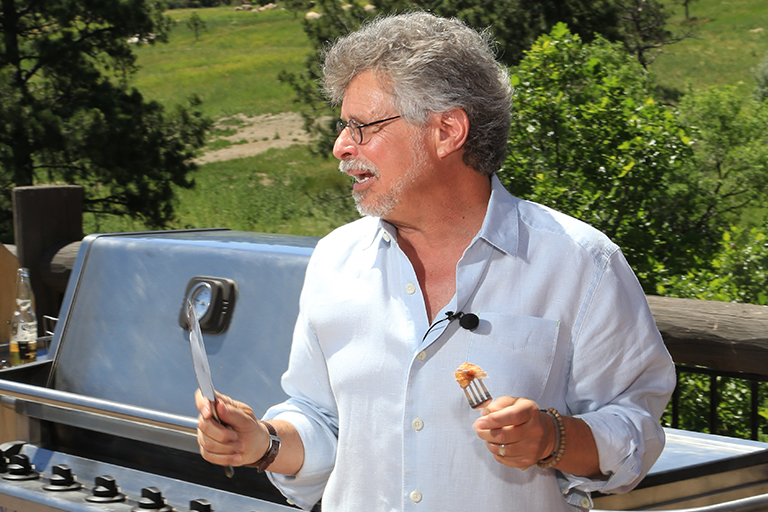By Amy Higgins
Before I met Steven Raichlen, the words “grilling and “barbecuing” seemed synonymous when referencing outdoor cooking. My guess is, I’m not the only one who was unschooled about the differences. With grilling, it turns out, you use high heat and a short cooking time to cook small, tender pieces of food. You grill a steak, vegetables, chicken breast, shrimp and the like.
Barbecuing is different. “True barbecue is both indirect and direct,” Raichlen explains. “The food is next to, not right over, the fire; a much lower temperature; always in the presence of wood smoke.” Meats you might barbecue include a brisket, baby back ribs, spare ribs or a pork shoulder.
And, of course, there’s smoking. “All barbecued foods are smoked but not all smoked foods are barbecued,” Raichlen says. Think about smoked salmon, pastrami or that big bird come Thanksgiving. Wood smoke creates a unique flavor that can heighten the taste of your dish. The type and size of wood – chips, chunks or logs – play an integral role in how profound the smoky flavor will be.
So, how do you get the best flavor possible when barbecuing and grilling? The secret is in the sauce – and the rubs and marinades. To cook like a pro, Raichlen suggests using at least one of these methods. “Here’s the way to think about it: you can take a tuna steak, grill it, it’s very tasty. It’s a little uninteresting, but it’s very tasty,” Raichlen explains. “You could put a rub on it first – and the rub might be, for that I might do an Asian rub with five-spice powder, salt, pepper and sugar – and grill it, and you get an extra layer of flavor. Already you added a dimension to it.
“While it’s grilling, you could baste it with scallion oil or garlic/cilantro butter and add a second layer of flavor,” Raichlen says. Once you remove the fish from the grill, cut it up and serve with a sauce, such as an Asian salsa. “So, you’ve taken what is a ‘Plain Jane’ protein and you added multiple layers of flavor. That’s how the pros make barbecue and grilling that is over the top,” he says. “If you think of barbecue as fashion, rubs, sauces and marinades are like the accessories.”
Raichlen likes to use marinades for lean meats because they add moisture, resulting in a tenderer piece of meat. How long you marinade depends on the structure of the marinade and the size of the food being marinated. Shrimp, for example, could marinate for 15 to 30 minutes while a chicken breast might marinate for an hour or two and a pork shoulder could take up to two days.
But those times aren’t set in stone. “If your marinade is herbs and olive oil, you could marinate that shrimp for two hours,” Raichlen explains. “On the other hand, if it’s chilies and lime juice, it would be shorter because those are more intense ingredients.”
If anyone knows how to cook it right every time, it’s Raichlen. Get hands on experience, meet fellow foodies and enjoy yourself by attending next year’s Barbecue University™. In the meantime, check out his newest book, Barbecue Sauces, Rubs and Marinades, to help perfect your dishes. In it, Raichlen explains what types of food each recipe pairs best with, how to pair it and also includes several finished dish recipes.
Amy Higgins attended Raichlen’s 2018 BBQ U™ and it sparked a fire in her grilling and barbecuing belly. Click here to read about it.

